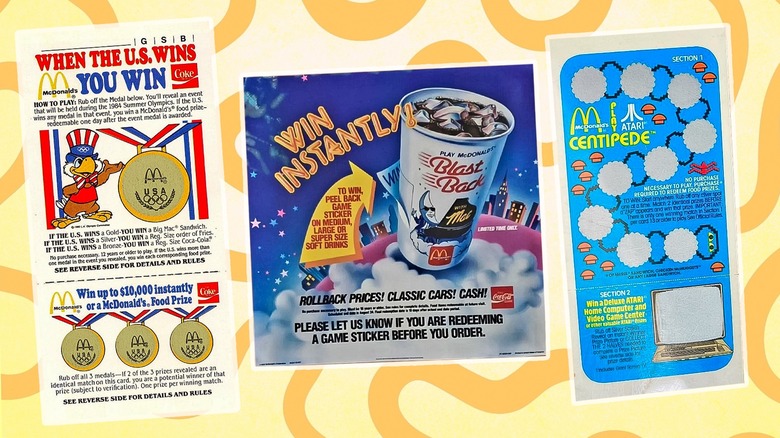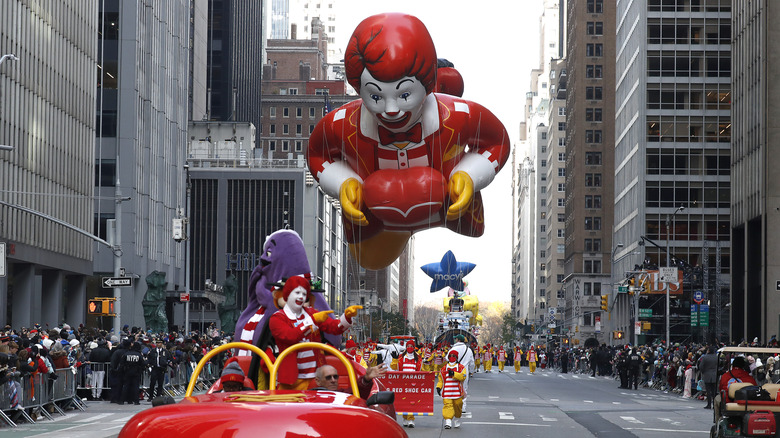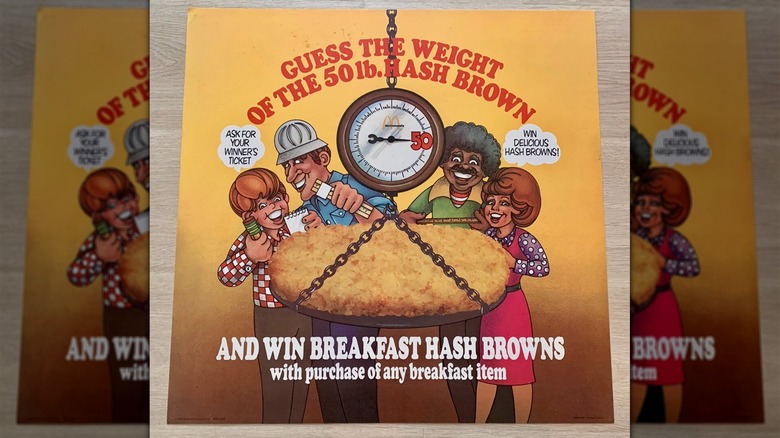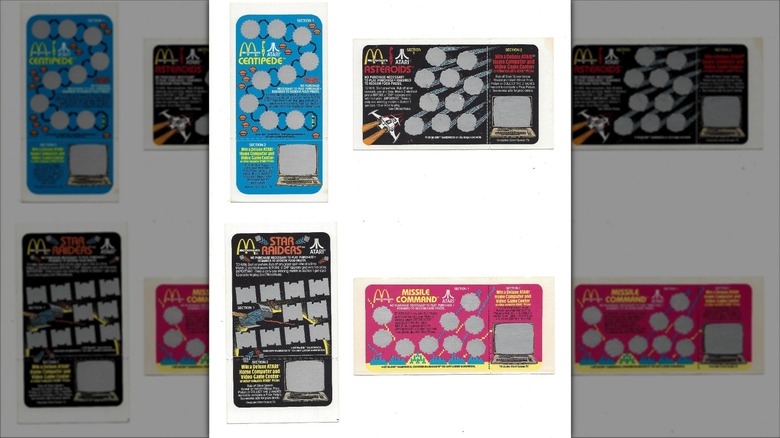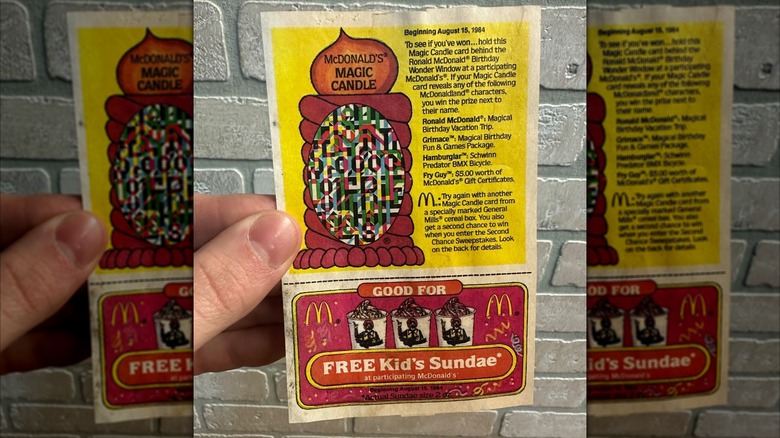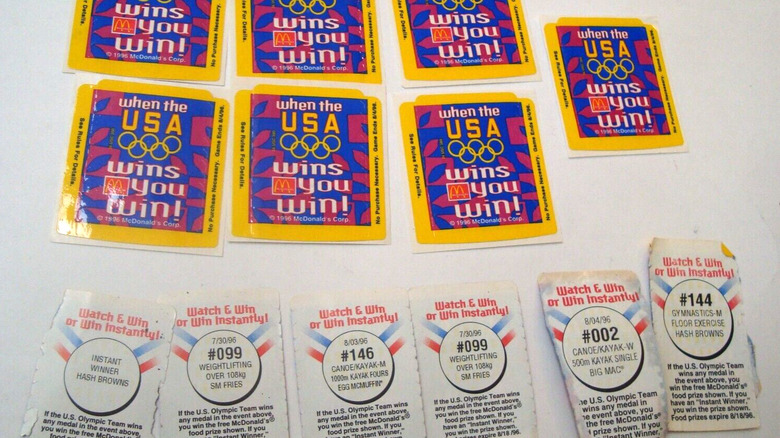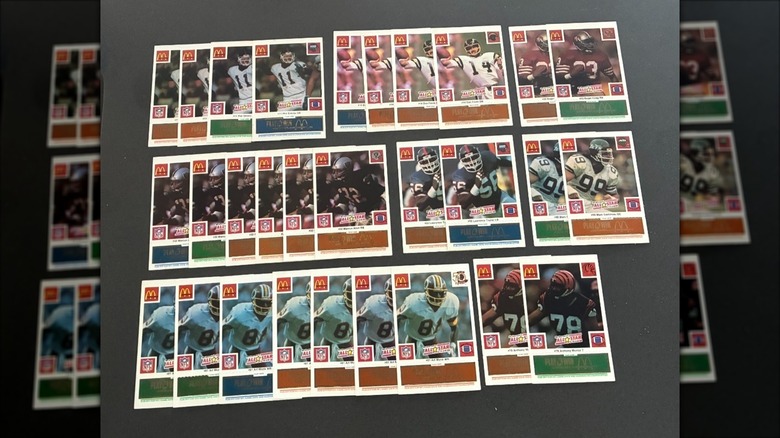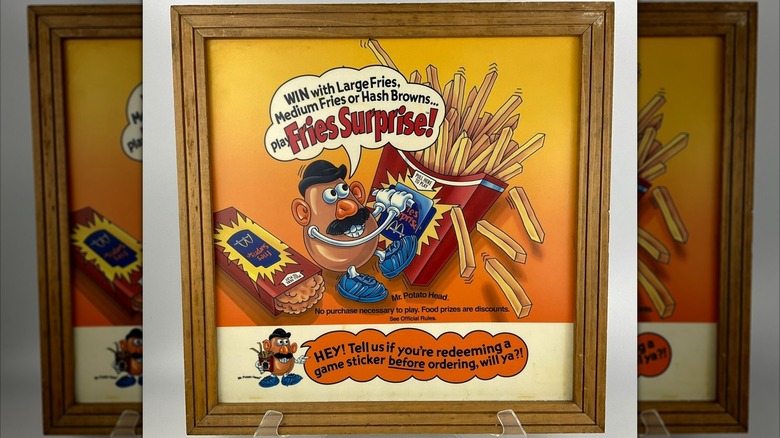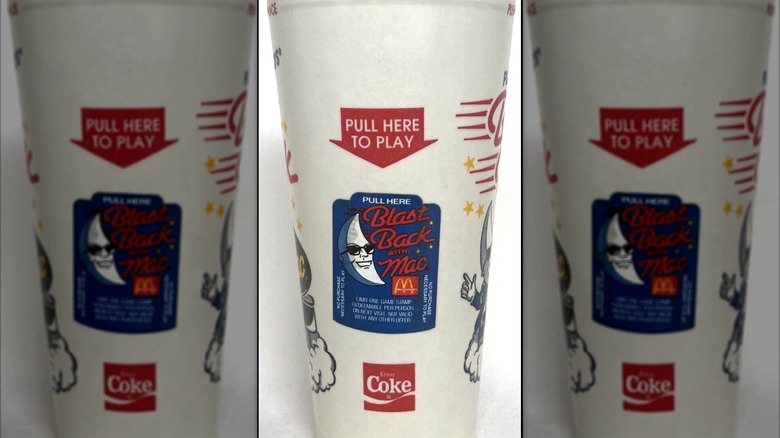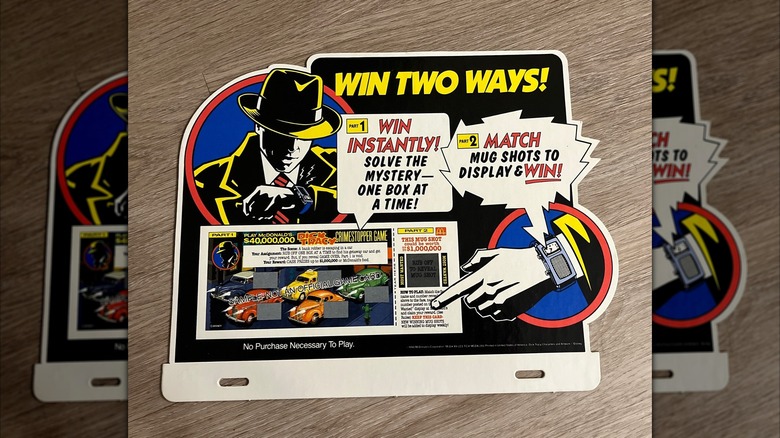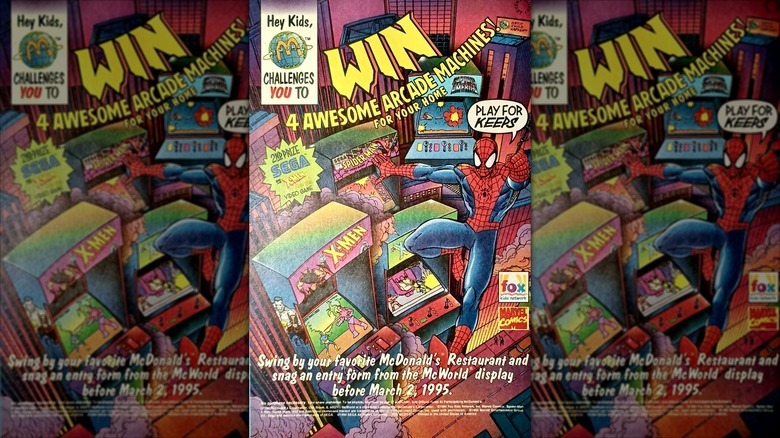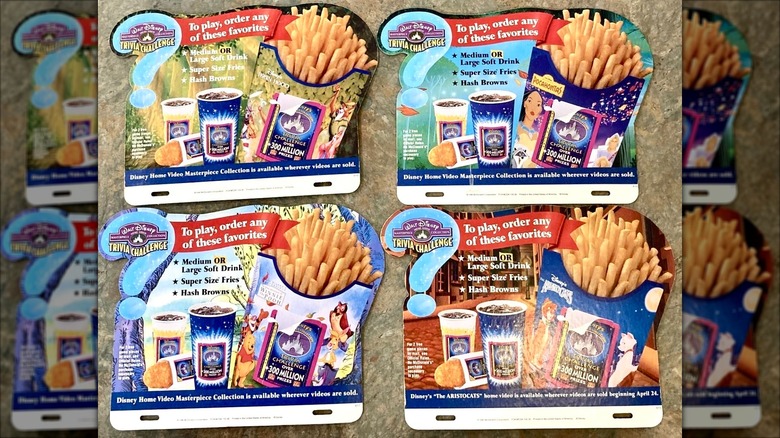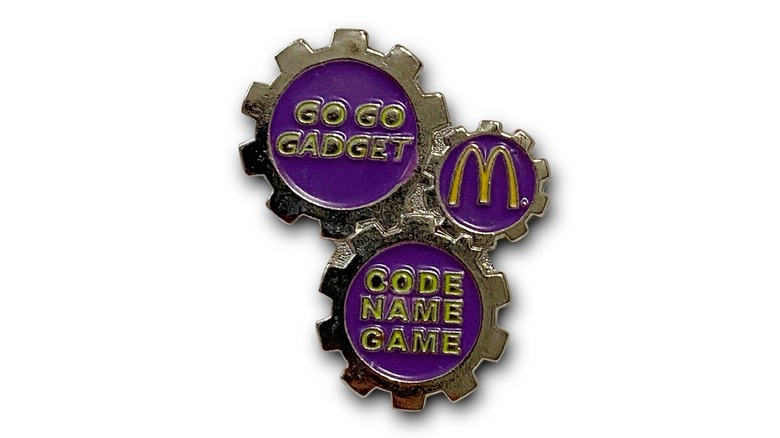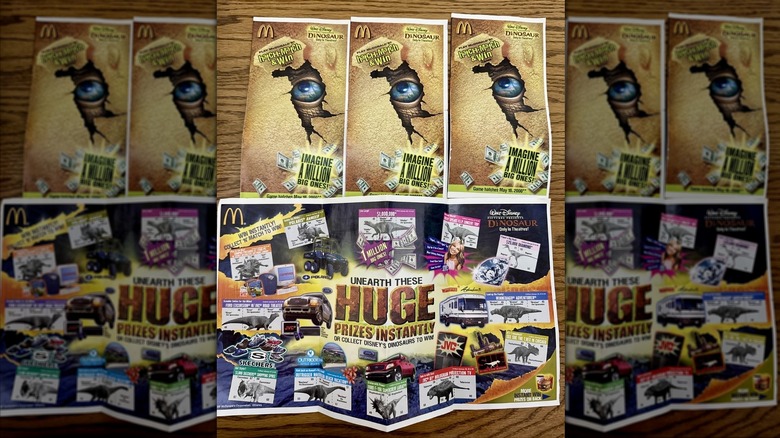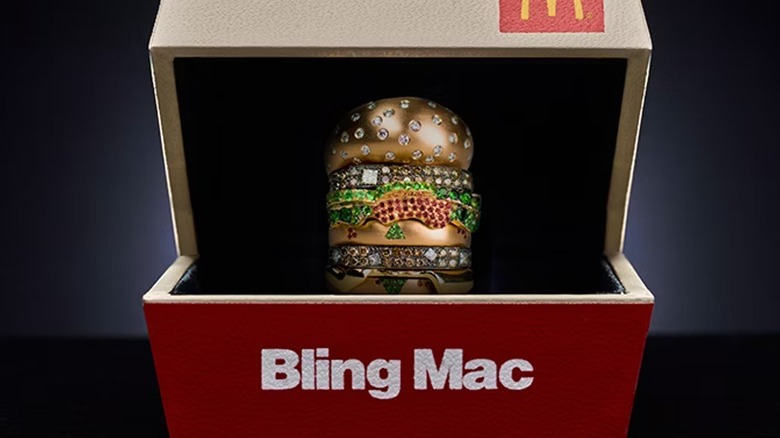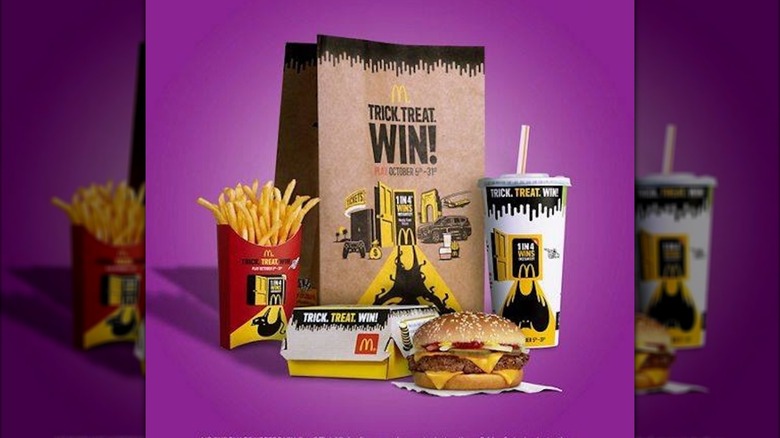15 McDonald's Games And Contests You Probably Forgot About
When it comes to contests and games, perhaps none have been more winning, creative, and delicious than the ones McDonald's has been running since the 1960s. Over the course of six decades, the biggest McDonald's contests and games have borrowed themes from the boards of Monopoly and Scrabble, made watching NBC a paid treat, and even rewarded one customer for listening to a song about its menu — to the tune of a million dollars.
There have been so many games over time that it's hard to keep track of them, let alone remember most of them. But we've revved up the time machine, and blasted back to the past, to see which forgotten games deserve an encore round of applause for simply existing. This roster includes stars like Dick Tracy, Mr. Potato Head, Inspector Gadget, and Mac Tonight; brain-busting Disney trivia; and wild McMemories, like when fans guessed how much a 50-pound hash brown weighs. Let's look back, and send these games and contests McBack to the future.
Ride on McDonald's Hamburger Float at the Macy's Thanksgiving Day Parade (1966)
McDonald's made its parade debut in the 40th Anniversary Macy's Thanksgiving Day Parade. To celebrate, the company ran a contest to give 25 kids, ages 7-14, plus one parent, an all expenses paid trip to New York to take part. Another prize included a "Be Our Guest" card, which netted the winner a free meal once a week at McDonald's.
The 1966 Macy's Thanksgiving Day Parade was hosted by Lorne Greene and Betty White, who saw the McDonald's float called Fantasyland make its way through New York City. This float featured the chain's distinctive Golden Arches, and it made a lot of noise via the world's largest drum. Ronald McDonald made his national TV debut that year, which helped skyrocket the spokes-clown to household name. The contest winners got to hang with Ronald, and also dress like spacemen for the occasion, complete with giant glass helmets.
Guess the Weight of the 50-Pound Hash Brown (1978)
The idea for the Egg McMuffin was hatched in 1971. Six years later, the company dreamed up a full breakfast menu that included the introduction of one of its best items ever: McDonald's hash browns, which were originally described in a newspaper ad as "funny-looking, great tasting." To prove the point, and let the public know how good they really were, McDonald's actually gave its hash browns away. All you had to do to win was purchase a single breakfast item, and answer the easiest question ever: How much does a 50-pound hash brown weigh?
To cheekily play up how easy the contest was, the accompanying print ad featured fake quotes like, "They could'a given us a hint," and "It's somewhere between 49 and 51..." The contest launched in the fall of 1977, and lasted well into the spring of the following year. Sadly, it's unclear how many hash browns were given away. Equally sad is the fact that McDonald's stopped serving breakfast all day.
Taste The Thrill of Atari (1982)
Before Nintendo, Xbox, and PlayStation were big names, Atari was an early pioneer that brought arcade games into the home. In 1982, the company partnered with McDonald's to capture the zeitgeist, and the attention of both brands' fans, with its Taste the Thrill of Atari game. The promotion simultaneously worked to drive sales of a new novelty item at McDonald's, the legendary and elusive McRib.
Taste the Thrill of Atari featured four scratch-off cards, each representing one of four hit Atari games: Asteroids, Centipede, Missile Command, and Star Raiders. Each card also offered two ways to win. First, players would scratch the cards to see if they'd receive one of the 50 Deluxe Atari Home Computer and Video Game Centers, 200 Atari stand-up arcade games, 1,200 Atari home computers, or 10,000 Atari home video game consoles being given away. If a scratcher revealed the word "ZAP," the game was over, but the player could trade the losing card for a $3 off rebate on an actual Atari game like Space Invaders, Circus Atari, or Warlords.
McDonald's Magic Candle (1984)
McDonald's didn't often partner with other food brands, but in 1984, it teamed up with General Mills to draw more attention to its birthday party packages with a contest called McDonald's Magic Candle. The sweepstakes offered a twist on the classic cereal box prizes. Instead of toys, boxes of Cheerios, Lucky Charms, and Trix contained chances to win in the form of groovy-looking game cards. Each displayed a scrambled image that, when brought into a McDonald's location, could reveal a McDonaldland character. What you won, or didn't, depended on what was on your card.
An image of Ronald McDonald got you a magical birthday trip to Disney World. Grimace's smile equaled a fun package that included a Sony Betamax recorder, a 13" TV, a cassette Walkman, and much more. The Hamburglar, who always needs a getaway vehicle, netted your own — a 500 Schwinn Predator BMX Bicycle. The odds of winning those major prizes were steep (about 1 in 10,416) but some kids walked away with McDonald's gift certificates, and invitations to host their friends for a birthday party at McDonald's. And every game card contained a coupon for a free kid's sundae, at least.
When the U.S. Wins, You Win (1976, 1984, 1988, 1996)
McDonald's relationship with The Olympics dates back to 1968, when it airlifted meals to homesick American athletes, and it became an official sponsor in 1976. For the Summer Games held that year in Montreal, McDonald's tapped Chicago marketing firm Frankel & Company to create When the U.S. Wins, You Win, a game played with cards representing Olympic events. If the U.S. medaled in that event, those who had the right card won food prizes.
The fast food franchise boycotted the 1980 Summer Games in Moscow, but brought its contest back in 1984, when the Olympics were held in Los Angeles. That year, McDonald's Olympics promotion backfired when American athletes exceeded expectations, making for a costly campaign. Some locations even ran out of Big Macs. "There's been a real gold rush at McDonald's," the company told the New York Times. But that didn't deter McDonald's from running the game again in 1988, and 1996. The partnership continued well into the 21st century, until McDonald's and the Olympics mutually agreed to end it in 2017.
Kickoff Payoff (1986 & 1993)
In 1985, while the Chicago Bears were putting together one of the best football seasons ever, McDonald's was creating a local promotion to match. The two brands, headquartered in the same city, released a series of trading cards that each came with a coupon for free food. A year later, McDonald's took the game national, partnering with the entire NFL for Kickoff Payoff, a game involving trading cards with scratch-off, tear-off coupons that could be redeemed for free food when certain teams won. If you lived in or near a city with an NFL team, that team's cards were available at your local McDonald's. If not, you could collect a set of 24 All-Star player cards. Either way, the campaign encouraged repeat visits.
McDonald's revamped the game for the 1993 season, upping the ante with game pieces on football-themed cups, hash brown packaging, and fry containers. And the prizes were bigger: Customers could win a trip to the Super Bowl XXVIII or Pro Bowl, NFL season tickets, or a Buick LeSabre, which was the official car of the Super Bowl.
Fries Surprise (1989)
In 1990, McDonald's made its popular potato products even more appealing when it affixed game pieces to the packaging of fries and hash browns. Players could peel them off for the chance to win Fries Surprise, a game promoted by none other than Mr. Potato Head himself. In commercials for the sweepstakes, the iconic toy doled out puns like "'more winners are sprouting up every day," and "get off your couch, potatoes."
Legendary rewards included cash, Jeep Cherokees, and flights to anywhere United Airlines went. Just as legendary were the stories of those who won them, like the two teen girls who shared a midnight snack, and then a $10,000 jackpot, and the newspaper columnist who didn't believe that his daughter had won because she told him on April Fool's Day. In one sad tale, a Canadian visiting Florida with family peeled off a game piece worth an annual trip for two to Maui, for five years straight. Unfortunately, because she didn't live in the U.S., she wasn't eligible to collect her prize. She told The Toronto Star: "They should have called the game 'Fries Surprise Pack of Lies.'" McDonald's, in turn, sent her $10 worth of coupons.
Blast Back With Mac (1989)
While mascots like Ronald McDonald and his buddies have always hogged the McSpotlight, one of the coolest cats to come out of McDonaldland was the moon-faced, sunglasses-sporting, piano-clanging Mac Tonight. In 1989, Mr. Tonight celebrated the good old 1950s days of the chain with a game called Blast Back With Mac.
These special game pieces were only available on medium and large cups, all adorned with Mac's likeness, and the prizes were appropriately retro in nature. They included sweet-looking classic cars from the era (one winner nabbed a 1957 Chevy) as well as rocking items like jukeboxes, RCA Camcorders, and Sony Walkmans complete with rock 'n roll cassette collections. Others enjoyed throwback pricing on food, like 59¢ Big Macs, and 25¢ fries and cheeseburgers. Also up for grabs were Disney vacations, including a visit to the newly opened Disney-MGM Studios. To top it all off, Blast Back With Mac turned some fans into instant cash winners. Among them was one McDonald's customer who reportedly almost tossed $1,000 in the trash. Thankfully, her daughter stepped in to save the day.
Dick Tracy Crimestopper (1990)
Following the smash success of "Batman" in 1989, Disney tapped fictional police detective Dick Tracy to headline his own superhero movie. It was released the following summer to great fanfare, including the launch of over 100 promotional products. While the much-hyped movie didn't quite hit the mark, it did give the world something great: the Dick Tracy Crimestoppers game at McDonald's.
First introduced in a comic strip in 1947, Crimestoppers were dutiful citizens who helped Dick Tracy thwart the bad guys. The McDonald's game involved beautifully designed and artful cards, each depicting a crime scene. Card holders became Crimestoppers when they scratched the cards, revealing an important piece of evidence, or even correctly identifying the cartoony mobster caught in the act. They also won $40 million in prizes.
A bank teller in Arlington, Texas, famously won the grand prize of a million dollars. While her husband reportedly wanted to buy horses, and her daughter wanted a sports car with a car phone, the winner told the Fort Worth Star-Telegram that she just wanted to "live a little." Meanwhile, another player sued McDonald's for $70 on behalf of his son, claiming (per Advertising Age via the Pittsburgh Post-Gazette) that the sweepstakes created "an injurious gambling fever to play McDonald's illegal lottery, requesting plaintiff on a near-daily basis to take him to various McDonald's stores."
McWorld Contests (1994 and beyond)
In 1993, McDonald's hired the ad firm Leo Burnett to help them woo new customers, ages 8-13. In return, it got a whole new McWorld. Via splashy commercials that ran during Saturday morning cartoons, and after school, McDonald's dared kids to dream big, and launched a series of contests to help them do it. The McDonald's McWorld Fantasy Sweepstakes was a hit with its target audience. What kid wouldn't want to win four Marvel video arcade games for their home, or the opportunity to get slimed at Nickelodeon Studios?
Of the big winners, one was 8-year-old Erik Jenks of Lititz, Pennsylvania, who received a free trip for four to Hollywood. The tour included a $1,000 shopping spree, a stop at Universal Studios, some exclusive McWorld clothing, and even a TV appearance to promote those goods. Meanwhile, Peter Schinas surely became the most popular kid at Roosevelt Junior High in New Bedford, Massachusetts when he won a Fox Rocks Your School concert by Boyz II Men, complete with the boy band handing out roses, and all the kids being treated to McDonald's for lunch.
Disney Masterpiece Collection Trivia Challenge (1996)
In the mid-1990s, VHS tapes were a big moneymaker, and Disney was cashing in with its Masterpiece Collection, a line of repackaged classic films. To get in on the action, McDonald's partnered with Disney in the spring of 1996 to launch the Disney Masterpiece Collection Trivia Challenge, which featured 6,000 questions on over 300 million winning game pieces that fans could get by purchasing McDonald's food. They could then test their knowledge of the brand with questions like, which "Pinocchio" character was added nine months after production started? (Answer: Jiminy Cricket.)
At a time that was essentially pre-internet, prize-hungry fans would call the New York Public Library, and the Academy of Motion Picture Arts Sciences in search of answers. Director of the latter, Linda Harris Mehr, told Entertainment Weekly (via the Anderson Independent-Mail): "Some of the questions are obscure. Even our staff would have trouble answering them."
To win a $1 million cash prize, 16-year-old J.R. Donnelly of North Platte, Nebraska helped his mom answer a question about Mickey Mouse. College baseball player Johnny Briseño won a Dodge Viper , while the luckiest 3-year-old on Earth, Kendall Roebuck of Newton, Mississippi, got a year's worth of Happy Meals.
Inspector Gadget QPC Code Name Game (1999)
"Inspector Gadget" was a short-lived, yet beloved, 1980s cartoon about a bumbling detective with many namesake tools, which he used in inventive ways to save the day. In 1999, Disney dusted off its intellectual property to release a live-action, big-screen adventure starring Matthew Broderick. To build buzz, Inspector Gadget's likeness and spirit were used to create a contest called the QPC Code Game at McDonald's. As the name implies, game pieces for the QPC Code Game could be found on Quarter Pounder with Cheese wrappers, but they were also available on cups, and fry containers. The pieces featured codes that spelled out their coordinating prizes. "JVC" got the player a home entertainment system, while "SUV" meant they had won a Chevy Tahoe.
Like McDonald's infamous Monopoly game scandal, the QPC Code Game led to indictments for fraudulent activity after a couple was recruited to "win" matching his and her Chevy Camaros. On a less scandalous note, this contest also inspired the satirical Onion article, "Area Man Finds Soda-Winning Game Piece He Forgot About."
Hatch-Match & Win (2000)
In 1993, "Jurassic Park" was a big moneymaker at the box office. Seven years later, Disney still wanted a piece of that Mesozoic era moolah, so it released its now-forgotten film called simply "Dinosaur." To advertise its existence that summer, in 2000, the film studio teamed up with one of its favorite promotional partners, McDonald's, to introduce the Hatch-Match & Win game.
To play the game, McDonald's customers collected pieces that featured body parts of the main dino characters, with the goal being to complete the picture to win a prize. The sweepstake's TV ad cheekily showed a teenager walking around town, trying to match the tail piece he'd earned to the bodies of real humans he saw. The junior paleontologists lucky enough to make a match were handsomely rewarded with prizes like free Skechers shoes, a Compaq PC, a Polaris Ranger, a Ford F-150 or Ford Excursion, tickets to a Britney Spears concert plus a meet and greet, a Hawaiian vacation, a trip to Chicago, a $25,000 diamond, a Winnebago, and a cool million bucks in cash.
Bling Mac (2018)
The Big Mac, which was shockingly almost named something else, was born in 1967, and launched nationally a year later. To celebrate its golden anniversary 50 years later, and to promote the new Grand and Jr. sizes on the menu, McDonald's introduced its most sparkly sweepstakes yet. For Valentine's Day 2018, the chain unveiled its $12,500 Bling Mac Ring, a bejeweled, wearable replica of its signature burger that one romantic customer could win. All they had to do was pen their own vows proving their love of the Big Mac on Twitter, now known as X.
The Bling Mac was designed by fine jewelry designer Nadine Ghosn, who told National Jeweler that executives at McDonald's "were very adamant about having every burger ingredient represented in the ring." To satisfy those requirements, Ghosn utilized white diamonds to represent the sesame seeds on the bun, as well as onions.
The big winner wound up being a client of Ghosn's, Robert Yee of Forest Hills, New York. Mr. Yee's winning words of love, which end with "I ♥️ you Big Mac: no matter the cost," can still be read in their entirety on X.
Trick. Treat. Win! (2018)
October was long seen as a dead month of business for McDonald's. In 2018, it decided to scare up some new customers, and encourage them to download the McDonald's app, with a game: Trick. Treat. Win! The fun revolved around peel-off pieces that promised a win (mainly of free food) in one of four tries, and the chain played up this good fortune in TV ads featuring viral meme sensation Kyle Craven, aka Bad Luck Brian.
The promotion ran from October 5 through October 31. During that time, pieces were found on ghoulishly designed packages featuring bats, mummies, and Frankenstein. In addition to free food, customers had the chance to win daily sweepstakes with prizes like cash, trips to the Caribbean, tickets to football games and Universal Studios, Spirit Halloween gift certificates, Redbox rentals, Roku TVs, and the final grand prize: McDonald's food for life, along with a check for $15,600. But perhaps the biggest winner of all was McDonald's. According to the Marketing + Media Alliance, the game saw 1.3 billion sweepstakes entries, 31 million site visits, and 4.1 million app downloads, making it the second most downloaded app that month, behind only YouTube.
